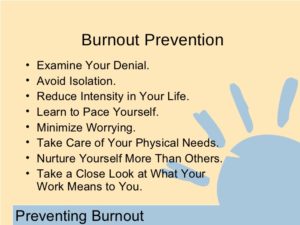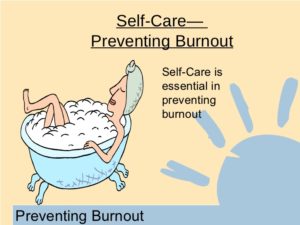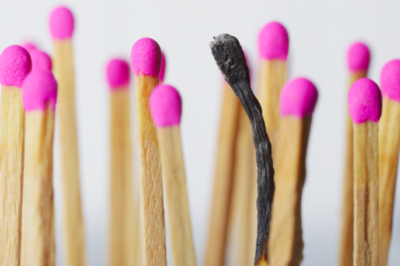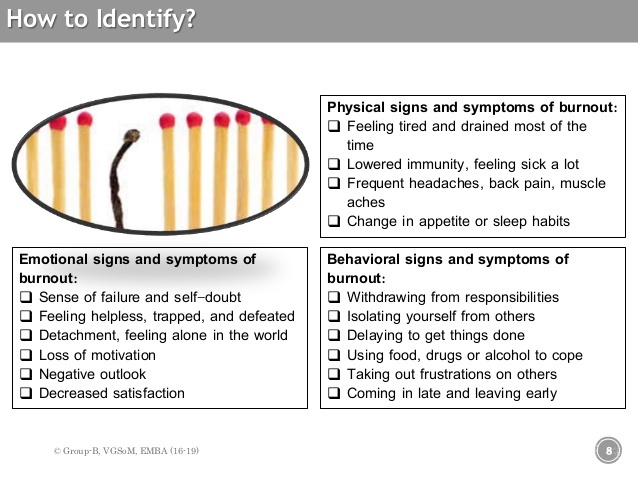Have you ever heard of burnout theory? Burnout theory was introduced by Freudenberger and Richelson in 1980 as a mental condition of emotional fatigue, depersonalization, and a decreased sense of individual achievements. Back then burnout theory was mostly paired with professions such as teachers, nurses, and lawyers, but I think it can really be experienced by anyone, and especially those in demanding positions.
There does not seem to be a way to specifically measure burnout for each individual, but professionals do have different tools they use to identify burnout. These measurement tools consider things like emotional exhaustion, depersonalization, and lack of personal accomplishment and symptoms such as feeling exhausted all the time, viewing everything as negative or bad, or feeling numb throughout the day, can be prevalent. I think for all of us at one point, or another will likely experience at least one or more of these sensations in our careers. We work hard and tirelessly to establish ourselves in our career paths and are continuously pushing the boundaries set for us, all while working long hours, jumping from event to event, and continuously pushing the envelope of what we can physically and mentally handle. We likely all know someone who has burned out or is burning out, and we’ve all likely experienced some of the symptoms at one time or another.
As many of us are coming off of the busy summer season full of tours and festivals, some of us will take a small break before jumping into corporate and holiday shows while others won’t take any breaks at all. A majority of us are already looking at the next season; planning our schedules, routes, and stops to stay gainfully employed for the next year. No matter what stage of the year you are in as you continue to move forward be careful of the potential for burnout and if you do experience burnout consider a few of these items to prevent and cope with it.
First, if you feel burnout, or anticipate having this experience soon, try taking some time away from the job. Giving yourself a break can be the best thing you could do. Taking a moment to step away and focus on yourself can be a good thing. Taking a break and reset yourself emotionally and physically to a point where when you do start again you can tackle the issues that felt like huge mountains before with ease. Give yourself the right amount of time to refresh. Without sufficient time, your burnout will quickly return, and you will be dealing with its elements again, too soon.
Second, work to gain a sense of control. Spend time organizing yourself, your priorities, and your goals. Refocusing can help you establish a new sense of self and priorities that matter most to you. Gaining a sense of control can be reassuring and energizing as you refocus on the things that matter most to you. Control your situation and life, by removing things that stress you out and adding things you enjoy the most. Finding life balance is important, and you will need to analyze and establish your priorities to heal.
 Third, pay attention to what your body needs, which is likely some sleep and exercise. When we get busy, these are often the first things sacrificed. Listen to your body and if you feel tired, get some rest. Sleep can help your body and mind heal. When you are sick, emotionally or physically, rest and adequate sleep are always recommended. Although often set aside in our industry, sleep can reset us physically and mentally. Research has shown that lack of sleep increases your risk of injury and accidents, impairs your judgment, increases forgetfulness, can cause depression, impacts your metabolism, and can cause serious health problems, such as heart disease, high blood pressure and more. It’s healthy to spend time resting to recuperate and sleep when you need to, but also make sure you don’t become a couch potato either. If you don’t already, introduce exercise into your routine. Find an exercise routine you enjoy that can be as simple as walking or as physical as kickboxing but work it into your daily and weekly routine. Exercise is healthy for you mentally and physically. Work toward building the muscles you need to do your job, meet weight goals and relieve stress. Endorphins from exercising can help reset your system and help you recover from burnout in many ways and build endurance for the future. You are also physically using your body so when you do get back to work you will have the stamina to do the job.
Third, pay attention to what your body needs, which is likely some sleep and exercise. When we get busy, these are often the first things sacrificed. Listen to your body and if you feel tired, get some rest. Sleep can help your body and mind heal. When you are sick, emotionally or physically, rest and adequate sleep are always recommended. Although often set aside in our industry, sleep can reset us physically and mentally. Research has shown that lack of sleep increases your risk of injury and accidents, impairs your judgment, increases forgetfulness, can cause depression, impacts your metabolism, and can cause serious health problems, such as heart disease, high blood pressure and more. It’s healthy to spend time resting to recuperate and sleep when you need to, but also make sure you don’t become a couch potato either. If you don’t already, introduce exercise into your routine. Find an exercise routine you enjoy that can be as simple as walking or as physical as kickboxing but work it into your daily and weekly routine. Exercise is healthy for you mentally and physically. Work toward building the muscles you need to do your job, meet weight goals and relieve stress. Endorphins from exercising can help reset your system and help you recover from burnout in many ways and build endurance for the future. You are also physically using your body so when you do get back to work you will have the stamina to do the job.
 There are many other tips to prevent and recover from burnout and if you are experiencing burnout or the symptoms of burnout, make sure to reach out so those who can help. Consulting a physician or mental health professional can provide you with specific tips for you to work through your burnout and can help you return to your normal self quickly.
There are many other tips to prevent and recover from burnout and if you are experiencing burnout or the symptoms of burnout, make sure to reach out so those who can help. Consulting a physician or mental health professional can provide you with specific tips for you to work through your burnout and can help you return to your normal self quickly.
For more information about burnout and how to prevent or recover from burnout, the effects of lack of sleep, and the benefits of exercise consider reading these articles:
Techniques for Dealing with Overwhelming Stress
To Recover from Burnout, Regain Your Sense of Control
10 Things to Hate About Sleep Loss
Exercise: 7 benefits of regular physical activity

